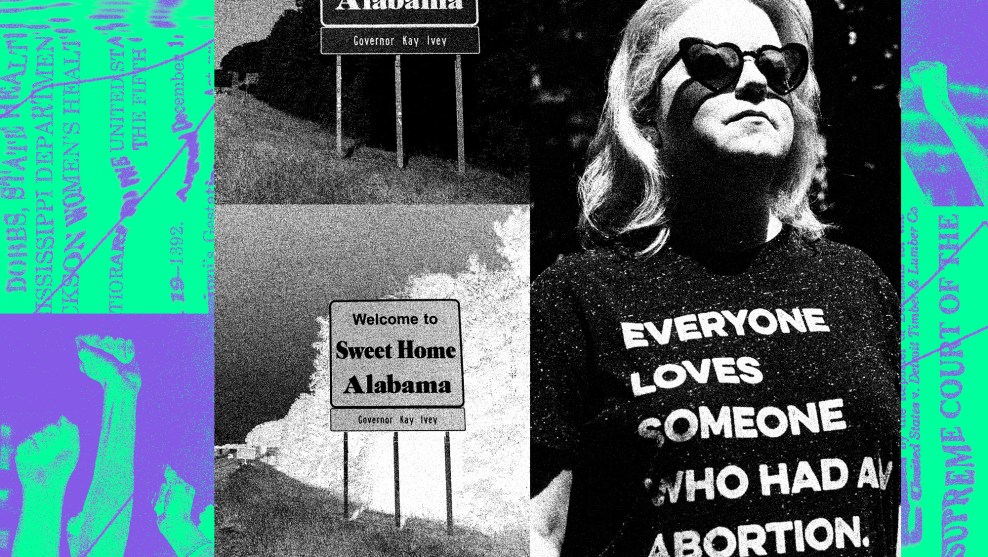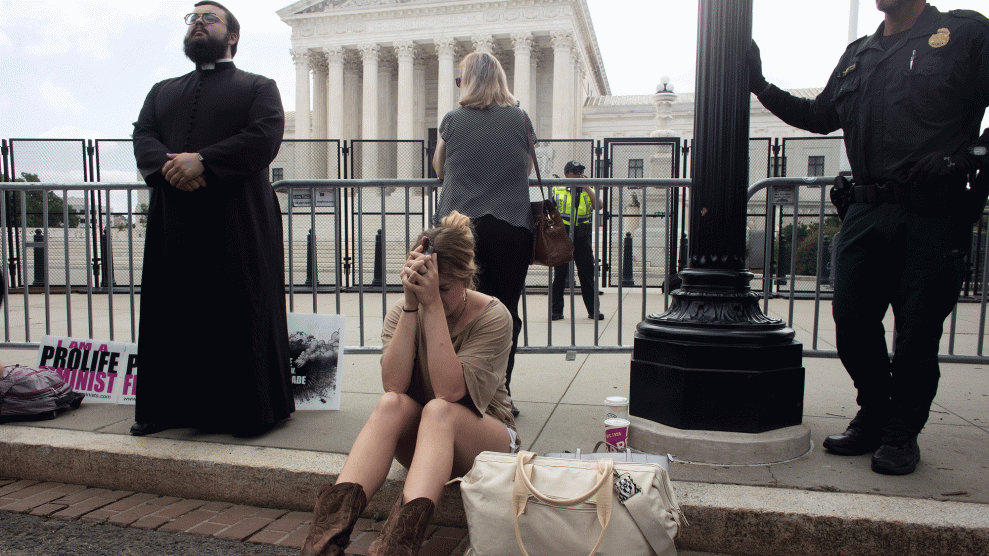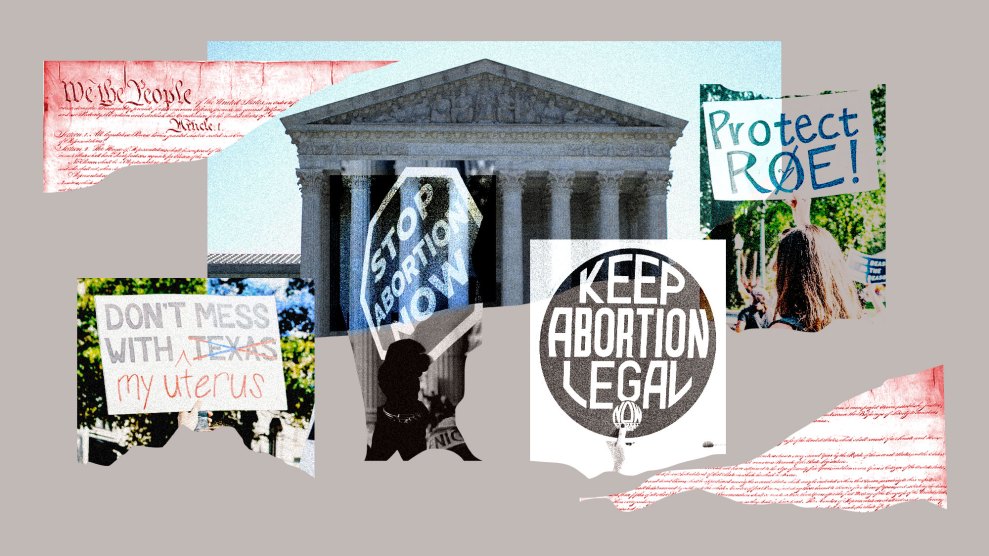Where Do We Go From Here? is a series of stories that explore the future of abortion. It is a collaboration between Mother Jones and Rewire News Group. You can read the rest of the package here.
The same year Harriet Tubman escaped enslavement on a Maryland plantation and Elizabeth Blackwell became the first woman ever to receive a US medical degree, three white men in the brand-new state of Wisconsin drafted a law to make abortion a felony. It was 1849, and at first, their law only criminalized doctors who ended pregnancies after “quickening,” when fetal movement could be felt. But nine years later, as the story goes, a Baptist minister-turned-doctor convinced state legislators to expand the ban, outlawing abortion at any point in pregnancy.
For nearly 50 years, that state law has gathered dust, made irrelevant by Roe v. Wade. But on June 24, when the Supreme Court upended decades of precedent and eliminated the national right to abortion, the old Wisconsin statute rose from the grave.
The resurrected law exempts abortion seekers from being charged with a crime, and it has a carveout for cases in which abortion is necessary to save a mother’s life. Instead, it targets healthcare providers: the doctors and clinic staff who help thousands of people end their pregnancies in Wisconsin every year. So on the 24th, Planned Parenthood of Wisconsin, which ran three of the state’s four abortion clinics, was faced with a perilous, long-anticipated question: Would their employees be arrested and jailed if they continued the work they’d been doing for decades?
There were so many factors to consider—including whether anyone would, or even could, enforce the ban. The elected prosecutors in Madison and Milwaukee, where two Planned Parenthood clinics are located, had pledged not to file charges against abortion providers, but future district attorneys might try to bring a case. So might private citizens, who could use the state’s unusual “John Doe” law to ask a judge to launch a criminal investigation. Wisconsin’s attorney general, Josh Kaul, had said his office wouldn’t support charges under the old ban, but he doesn’t have the power to stop local prosecutors from filing them. The Democratic governor, Tony Evers, had mentioned giving clemency to abortion providers. But he is up for reelection.
“It’s that risk, that open question of law, that has made us pause and say, ‘Okay, we’re going to pause our abortion care until we have some clarity,’” says Michelle Velasquez, Planned Parenthood of Wisconsin’s director of legal advocacy and services.
So on the day of the ruling, clinic staffers went out to their waiting rooms to tell patients they wouldn’t be seen. About 70 people had appointments canceled, leaving them unsure if they would be forced to give birth, or if they’d be able to get an abortion in another state.
With Roe overturned and blanket abortion bans snapping into place across the South and Midwest, healthcare workers who provide abortions are now faced with the same complicated math that Planned Parenthood of Wisconsin had to wrestle with. Whether abortion is illegal now depends on their state, but enforcement is a separate question. In large part, whether doctors will face criminal charges for defying the law is up to local prosecutors—a group of predominantly white, male officials, typically elected county by county.
Some expert observers and advocates believe prosecutors will see the end of Roe as a political, or moral, opportunity to crack down on anyone involved in an abortion. “I think it’s likely—in fact, inevitable—that we’re going to see some local prosecutors view this as their moment,” says Michelle Oberman, a law professor and author of Her Body, Our Laws: On the Frontlines of the Abortion War from El Salvador to Oklahoma. “Some may view it as something that their constituents demand. And others may feel that sort of moral urgency to do everything in their power to bring the one tool that they have, which is criminal law enforcement, to bear against people in their jurisdictions who end their pregnancies.”
On the other side, some prosecutors have pledged to protect the right to choose. In a joint letter organized by the group Fair and Just Prosecution, 89 district attorneys and attorneys general said they will decline to prosecute people who “seek, provide, or support” abortions. Many of the signers were from blue states where access to abortion is already protected. But the letter also included the top prosecutors from blue cities in red or purple states—like Nashville, Tennessee, Milwaukee, Wisconsin, and Jackson, Mississippi, home of the clinic at the heart of the Dobbs case.
“Not all of us agree on a personal or moral level on the issue of abortion,” the Fair and Just Prosecution letter said. “But we stand together in our firm belief that prosecutors have a responsibility to refrain from using limited criminal legal system resources to criminalize personal medical decisions.”
Their promise is a hard sell to abortion providers weighing the risks of jail time. “I don’t think most of us can count on the stated intentions of individual local prosecutors,” says Doug Laube, the former chair of obstetrics and gynecology at University of Wisconsin-Madison and a Planned Parenthood of Wisconsin abortion provider.
Part of the reason advocates are expecting a crackdown is the zealousness with which some prosecutors have long gone after women for suspected self-managed abortions. Even before Roe v. Wade fell, district attorneys were using charges of child neglect, feticide, and practicing medicine without a license to prosecute people who ended their pregnancies or were suspected of doing so. Between 1973 and 2020, National Advocates for Pregnant Women has documented over 1,700 cases in which people were arrested, detained, or forced into a medical intervention because they were perceived to have harmed or endangered their embryo or fetus.
Right now, the newly effective state abortion bans focus on penalties for abortion providers, not patients. But anyone who has kept an eye on prosecutions over the last 50 years is not optimistic that women and other pregnant people won’t be caught up in the crossfire, regardless of what the law says. Farah Diaz-Tello, senior counsel and legal director at the reproductive justice organization If/When/How, says her group is expecting an uptick of prosecutions against pregnant people, particularly in places where abortion is now illegal. “People will find ways to end pregnancies on their own, and they’re going to risk the possibility of arrest to do so,” Diaz-Tello says. “When people come to an emergency department experiencing obstetrical emergencies, when they’re having miscarriages that they can’t explain to somebody else’s satisfaction, this notion that abortion is something that is criminal and stigmatized leads to people being turned over to law enforcement.”
And if charging a pregnant woman is too politically risky, Oberman says district attorneys might now try to use “accomplice” laws already common in criminal codes to prosecute people who give them advice or practical support: sisters, mothers, boyfriends. “You could be an accomplice to abortion by paying for some of these abortions, by helping them do an internet search, by explaining to them how they could drive across the bridge, by helping them afford a bus ticket,” Oberman says.
It’s a potentially vast and terrifying dragnet—and that’s the point. “That’s what the anti-abortion movement is counting on,” Oberman says. “They’re counting on chilling behavior and isolating the person who’s facing an unwanted pregnancy. So it’ll be the threat of becoming embroiled in legal problems that causes folks—from parents, to boyfriends, to doctors, to counselors—to just stay out of it.”
At this moment of uncertainty, the fear of becoming embroiled in legal problems is even inhibiting some doctors in states where abortion is still legal. At the end of June, the Planned Parenthood of Montana president and CEO Martha Fuller instructed her organization’s clinics to stop giving medication abortions to people traveling from states with total abortion bans.
“As you know, the abortion access landscape is rapidly changing across our region,” she wrote. “The risks around cross-state provision of services area currently less than clear, with the potential for both civil and criminal action for providing abortions in states with bans.”
There are plenty of other reasons why healthcare workers might not see a guarantee from their local prosecutor as a real solution.
In some places, that’s because being charged with a crime isn’t the biggest threat to doctors. Instead, it’s the risk of a civil lawsuit, or the state medical board taking away their license to practice. In Hines County, Mississippi, the Jackson Women’s Health Organization runs Pink House, the last abortion clinic in the state and the subject of the Dobbs litigation. There, the local prosecutor, Jody Owens, signed the letter pledging not to prosecute anyone offering or receiving abortion services. Republican Gov. Tate Reeves, on the other hand, has said that “if a physician is attempting to practice medicine in the state of Mississippi, and they’re violating our law, then our state Board of Medical Licensure will pull their license from them.”
“Even if there were no risk of a criminal prosecution, state authorities might still take steps to take away the licenses of doctors to practice medicine and to close the clinic,” explains Pink House’s lawyer, Rob McDuff, an attorney at the Mississippi Center for Justice. Pink House closed its doors June 6, one day before a state law banning abortion took effect.
Elsewhere, the local prosecutors’ decision not to charge a crime might not be the final word. In some states, attorneys general can swoop in and file charges of their own if doing so is in the “public interest,” if another state official requests it, or if the local prosecutor has refused to enforce the law, according to an Emory Law Journal analysis. And legislatures that are angry about a “rogue” prosecutor are already experimenting with laws to sideline them. Such is the case for Nashville’s Glenn Funk, who joined the recent abortion letter. Last year, Funk said he would not enforce two new state laws—one that criminalized businessowners who failed to post a transphobic sign outside their bathrooms, and another that made it illegal for teachers to require students to mask up. A few months later, lawmakers passed a bill allowing court-appointed, temporary prosecutors to step in for any DA who made a blanket statement against prosecuting certain crimes.
Heather Allison, a reproductive justice fellow at Healthy and Free Tennessee, points out that even with a pro-choice prosecutor, police could still choose to arrest providers, sending them briefly to jail. “I just think it’s extremely unlikely that healthcare providers would be willing to risk criminalization just based off the promise of a prosecutor, especially because it’s still possible that they could be arrested,” Allison says.
Finally, there’s the question of whether current DAs will lose reelection to anti-abortion opponents. Part of the risk in Wisconsin, Velasquez explains, is that DAs there have a six-year window to file felony charges. “The risk of future prosecution isn’t zero just because a prosecutor today decides not to investigate and issue charges,” she says. “It would just depend on the priorities of whomever is taking over those offices.”
Two weeks ago, Wisconsin Attorney General Kaul sued in state court to block the 1849 law, arguing that the more lenient abortion restrictions the state passed after Roe—laws prohibiting abortions after viability, mandating parental consent, and imposing a 24-hour waiting period, among others—should supersede the older statute.
“I said last week I’d fight this every way we can with every power that we have, and that’s what we’re going to do,” Evers said at a press conference announcing the lawsuit. “If Republicans won’t do their part—what’s right—and help the people of the state, then we will.”
A judge has yet to weigh in, but it’s likely the case will make its way to the Wisconsin Supreme Court, which has a 4-3 conservative majority. There’s a chance the court’s partisan makeup could shift next April, when a right-leaning justice retires; a statewide election will determine her successor. But, according to Velasquez, that’s all moot if Evers loses his reelection bid in November to an opponent willing to sign a bill reaffirming the ban. Both GOP frontrunners—former lieutenant governor Rebecca Kleefisch and the Trump-endorsed construction executive Tim Michels—have voiced support for the 1849 law. At a late June debate, Kleefisch said she would try to remove Wisconsin district attorneys who refuse to enforce the ban.
According to Jenny Higgins, director of UW-Madison’s Collaborative for Reproductive Equity, some Wisconsin abortion providers have considered breaking the law to help pregnant people. “We have some providers in our state who are so committed to these issues and would risk jail for performing an abortion,” she says. But Wisconsinites who want or need to end a pregnancy are now being routed westward to Minnesota, south to Illinois, or anywhere else in the country where they have a support network.
It’s happening regardless of the state’s pro-choice prosecutors and liberal state leaders.
“Before Dobbs came down, Higgins says, “what I was observing in our state was a sense—among people who are not in the know—of ease. In that, ‘Hey, even if Roe is overturned, things will be okay in Wisconsin because we have Josh Kaul and we have Gov. Tony Evers who will veto [anti-abortion laws].’ Those of us the research and care delivery side kept saying, ‘No you don’t understand.’ Services will cease immediately.”
And so they have.

















